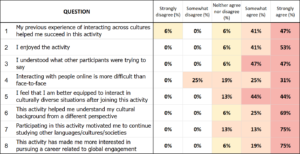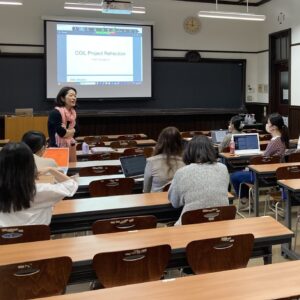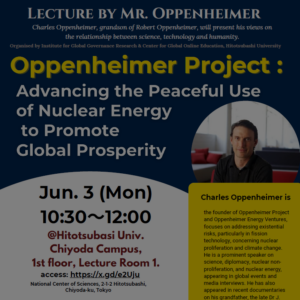COIL MODEL 1: Joint Project Development in the theme of “Liveability” Autumn 2023


(Final Group Presentation)
A COIL course organized between a team of Hitotsubashi University and Monash University centered on the aim of developing joint projects on the common theme of liveability. Students are from various academic backgrounds who major in Asian studies, international relations to economics. Under the common theme, 9 groups delivered their outputs on their selected topics: Public transportation, trains, student housing, ethnic diversity, educational facilities, physical disability infrastructure, mental health support, public safety, and educational inequality.
This course was originally designed by Professor Jeremy Breaden of Monash University, and then the Hitotsubashi team of Yukako Tanaka-Sakabe and Jun Onuki joined to arrange the new COIL course in collaboration with the Professor.
Here we introduce the way this COIL course is developed between the two partner universities and the main result of the post-class survey to the participants.
GROUP FORMATION AND COHESION PROCESS
The project progressed with the collaboration of instructors and teaching assistants from two universities, in the scope of offering opportunities for students to develop their joint projects in an online cross-cultural environment. In this unique setting, students are delved into collaborating with team members and producing outputs within certain limits of time and space, where many of them will be required to perform in their careers in this digital era.
<Preparation Phase>
Instructors developed 5 online session plans through several online meetings. The instructors created a joint introduction on-demand video to navigate students to the sessions, offering sessions’ objectives, goals, a basic definition, and discussions over the joint topic “liveability”. Additionally, students had access to an online learning module on intercultural competence in online collaborative learning provided by Monash University. These pre-session materials are tasks for students to complete prior to the first session.
<Implementation Phase>
The five sessions started with an introductory meeting for overviewing the project and having self-introduction in groups. Two consecutive sessions are conducted for group work where instructors move around each group’s online room to follow up on their work. By the end of the second session, students are required to submit their topic, then by the third week to go through a one-page check-up list of their projects. The fourth session is self-organized meetings to finalize and rehearse presentations. The last session is final presentations followed by a short Q& A and wrap-up by instructors.
| Pre-session | Access to pre-session materials |
| Session 1 | Overview of project and self-introduction/launching discussion in groups |
| Session 2 | Groupwork 1: Selecting topics |
| Session 3 | Groupwork 2: Data collection and analysis |
| Session 4 | Groupwork 3: Finalization of the project and rehearsal of the presentation |
| Session 5 | Final Presentation and Wrap-up |
| Post-session | Self-reflection/Group feedback |
(Schedule of Sessions)
<Icebreaking activities>
Each COIL session launches with icebreaking activities with the aim of enhancing the relationship among group members and engaging in a multicultural environment. Various icebreaking activities are arranged for each online class by the lead of the teaching assistants to facilitate students to get to know each other.

(Created based on GUTH & ROBIN (2015) “How to get started with COIL”. In: Globally networked teaching in the Humanities. Routledge.)
<Post-COIL session reflection>
Students wrote reflections on their experience in the joint sessions using a guideline provided by instructors. This aim was to review their group collaboration, personal contribution to the group, academic insights, and intercultural awareness/competence. Based on these reflections, Hitotsubashi students participated in an offline session to share their experiences on project formations.
POST-CLASS SURVEY ON ONLINE INTERCULTURAL EXCHANGE AND EVALUATION
A post-class evaluation survey was conducted to ask the participants about their individual experiences in online intercultural exchange during the COIL sessions. Monash University provided the survey under the research project “Enhancing Students’ Global Engagement and Improving Employability Outcomes through Online Intercultural Exchanges.” Ten students from Hitotsubashi and seven students from Monash responded.
<Student’s Self-reflection>
Cross-cultural discussions are expected to deepen one’s understanding of the multicultural environment, help one learn how to work in groups with people from various cultural backgrounds, and increase one’s confidence in communicating in English. As shown below, participants self-assessed their communication skills.
- “What I learned most from this experience was how to communicate effectively with people with diverse backgrounds” (Hitotsubashi University student)
- “I wish I’d known how foreign students prepare for presentations and conduct discussion.” (Hitotsubashi University student)
Some of the students are willing to apply such experiences in their future opportunities.
- “In the future, I’d like to participate in activities which involve students from multiple other countries.” (Monash University student)
- “I’d like to participate in activities which provide the opportunity for multicultural cooperation.” (Hitotsubashi University student)
<Survey Results>
Below are the selected survey results. Each question asks respondents to indicate how much they agree or disagree with each statement. The red-colored section of each question demonstrates the highest response.

(Selected Results of the Post-Class Survey)
The results showed that the group had high intercultural competency in general. As seen in question 1, 88 % of the respondents responded that their previous interactions across cultures helped them to succeed in the COIL session. This indicates that the majority of students already had some intercultural experience before attending the COIL sessions. More than 90% of the respondents were positive to the statement “I enjoy the activity” (question 2). Also, most of the respondents agreed with the statement “I understood what the other participants were trying to say” (question 3). Such results demonstrate proactive participation and interactions in the group.
Online communication within a tight time frame is challenging for students. The majority of respondents agreed that “Interacting with people online is more difficult than face-to-face” (question 4).
Within such limitations, it is notable that students feel that they gained intercultural competency through participation. 44% of the respondents strongly agreed that “I feel that I am better equipped to interact in culturally diverse situations”(question 5). Also, 69% of the respondents strongly agreed that “This activity helped me understand my cultural background from a different perspective.” (question 6).
Further, the responses have shown an increase of motivation to engage in a multilateral environment. 75% of students strongly agree that “Participating in this activity motivated me to continue studying other languages/ cultures/ societies” (question 7).
75% of students strongly agree that “This activity has made me more interested in pursuing a career related to global engagement” (question 8), showing that COIL sessions have motivated students to work globally in the future.
The results indicate generally positive effects of conducting project development style of COIL sessions, to strengthen students’ intercultural skills and motivate them for future engagement in a global environment. From an educational point of view, this type of COIL sessions offers a unique opportunity for students from diverse backgrounds to interact with each other in a short period of time and in online settings. Dealing with such settings is an increasing demand in the globalized digital era. The collaboration between Hitotsubashi and Monash is keeping further assessment of session components and guidance provision to support students’ learning.


